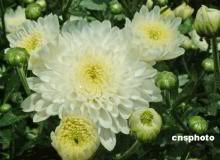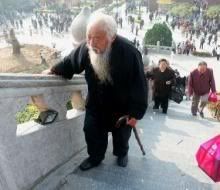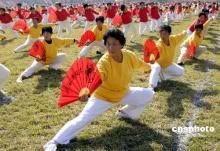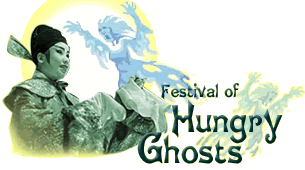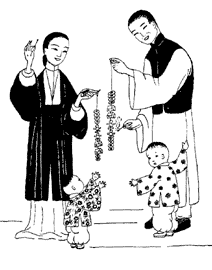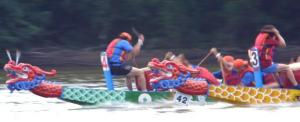Chinese Valentine's Day

The Festival to Plead for Skills (乞巧節; qǐ qiǎo jié)
The Seventh Sister's Birthday (七姐誕; qī jiě dàn)
The Night of Skills (巧夕; qiǎo xī)
In 2007, this festival falls on August 19.
The Story of Chinese Valentine's Day
Chinese Valentine's Day is on the 7th day of the 7th lunar month in the Chinese calendar. A love story for this day is about the 7th daughter of Emperor of Heaven and an orphaned cowherd. The Emperor separated them. The 7th daughter was forced to move to the star Vega and the cowherd moved to the star Altair. They are allowed to meet only once a year on the day of 7th day of 7th lunar month.
The story began from the good-looking poor orphaned boy living with his elder brother and sister-in-law. After his parents past away, his brother inherited the house and the land. The boy owned an old ox. He needed to work on the farm's field with the ox everyday. So he was called a cowherd. His daily life was just like in a Cinderella story.
The 7th daughter of Emperor is good at handcrafting, especially weaving clothing. So she was called a Weaving Maid. The Emperor likes her skill to weave clouds and rainbows to beautify the world.
The ox was actually an immortal from the Heaven. He made mistakes in the Heaven and was punished as an ox in the Earth. One day, the ox suddenly said to the cowherd, "You are a nice person. If you want to get married, go to the brook and your wish will be come true." The cowherd went to the brook and saw all 7 pretty daughters of Emperor came down from Heaven and took a bath in there. Fascinated by the youngest and also the most beautiful one, he took away her fairy clothes secretly. The other six fairies went away after bath. The youngest couldn't fly back without her fairy clothes. Then the cowherd appeared and told her that he would not return her clothes unless she promised to be his wife. After a little hesitation and with a mixture of shyness and eagerness, she agreed to the request from this handsome man. So they married and had two children two years later.
One day, the old ox was dying and told the cowherd that he should keep his hide for emergency purpose.
The Emperor found the sky's not that beautiful as before without the 7th daughter weaving clouds and rainbows. He wanted his daughter's grandmother to find the missing daughter and to bring her back. . While the 7th princess was flying to the Heaven with her grandmother, the cowboy wore the ox hide, took his children in two bamboo baskets with his wife's old fairy clothes and chased after his wife in the sky. The grandmother made a milky way in the sky with her hairpin, which kept them separated. The 7th princess was moved to the star Vega (The swooping - Eagle) in the Lyra (Harp) constellation. And the cowherd with his two children stayed in the star Altair (Flying one) in the Aquila (Eagle) constellation. The star of Vega is also known as the Weaving Maid Star and the star of Altair is as the Cowherd Star in China.
Magpies were moved by their true love and many of them gathered and formed a bridge for the couple to meet in the evening of the 7th day of the 7th lunar month, which is the day the Emperor allowed them to meet once a year.
They said that it's hard to find a magpie on Chinese Valentine's Day in China, because all magpies fly to make the bridge for the Weaving Maid and Cowherd. The one thing to prove that is the feathers on the head of the magpies are much lesser after the Chinese Valentine's Day. If the night Chinese Valentine's Day rains, the rain are the tears of the Weaving Maid and Cowherd.

